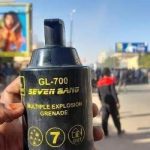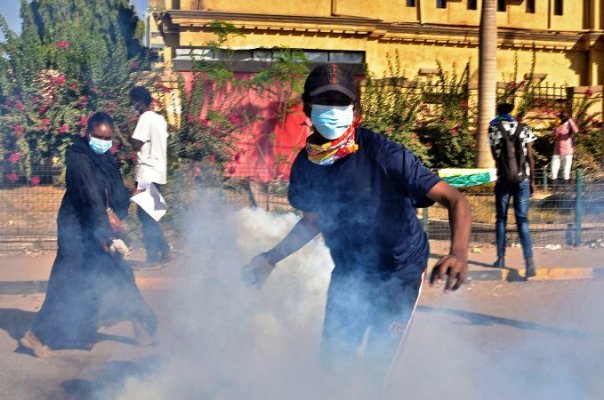Sudanese police use sound bombs, tear gas to disperse protesters
November 30, 2021 (KHARTOUM) – Sudanese police used tear gas and sound bombs on Tuesday to disperse demonstrators who, once again, took to the streets massively in Khartoum and several other states.
The protests organized by the Resistance Committees and Sudanese Professionals Association (SPA) headed to the Republican Palace in Khartoum where are the premises of the military-controlled Sovereign Council.
They chanted slogans rejecting any partnership with the military component, and the framework agreement that Prime Minister Abdallah Hamdok signed with them on November 21, 2021.
Central Committee of Sudanese Doctors (CCSD) late in the evening stated that 98 people were wounded including six seriously injured by sound bombs and the others were wounded by tear gas canons or inhaled the gas.

Sudan Tribune journalists noted the participation of some political leaders in the protests, some were just released after more than a month of detention such as Ibrahim al-Sheikh, former Industry Minister, Taj al-Din Ismail a SPA leading member and Wajdi Saleh of the Empowerment Removal Committee.
Also, Omer al-Diguair Chairman of the Sudanese Congress Party and Khalid Omer Youssif former Cabinet Affairs Minister took part in the huge rallies.
The police excessively used tear gas and sound bombs to prevent the protesters from reaching the Republican Palace.
Also, the surrounding streets witnessed hit-and-run operations between the police and the demonstrators who quickly regather again to head towards the palace.
Similar protests took place In Omdurman, Khartoum twine city, Madani of Al-Jazira State, Gadaref, in eastern Sudan, and Atbara in the Northern State and other state capitals.
43 Sudanese killed during the protests that took place after the coup of October 25.
Prime Minister Hamdok signed a political agreement with the coup leaders where he accepted to form a technocrat cabinet and to review the constitutional declaration governing the transitional period to associate al-Bashir’s former allies in the transitional institutions particularly the legislative council.
The Forces for Freedom and Change (FFC) rejected the deal and denounced its former prime minister accusing him of collusion with the coup leaders.
In a statement issued after the protests on Tuesday, the FFC hailed the popular determination to complete the revolution’s goals and “sweep away the brutal coup authority”.
(ST)

